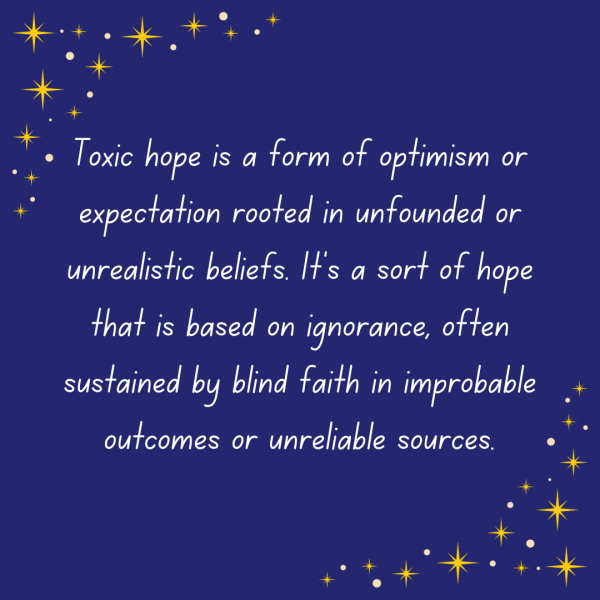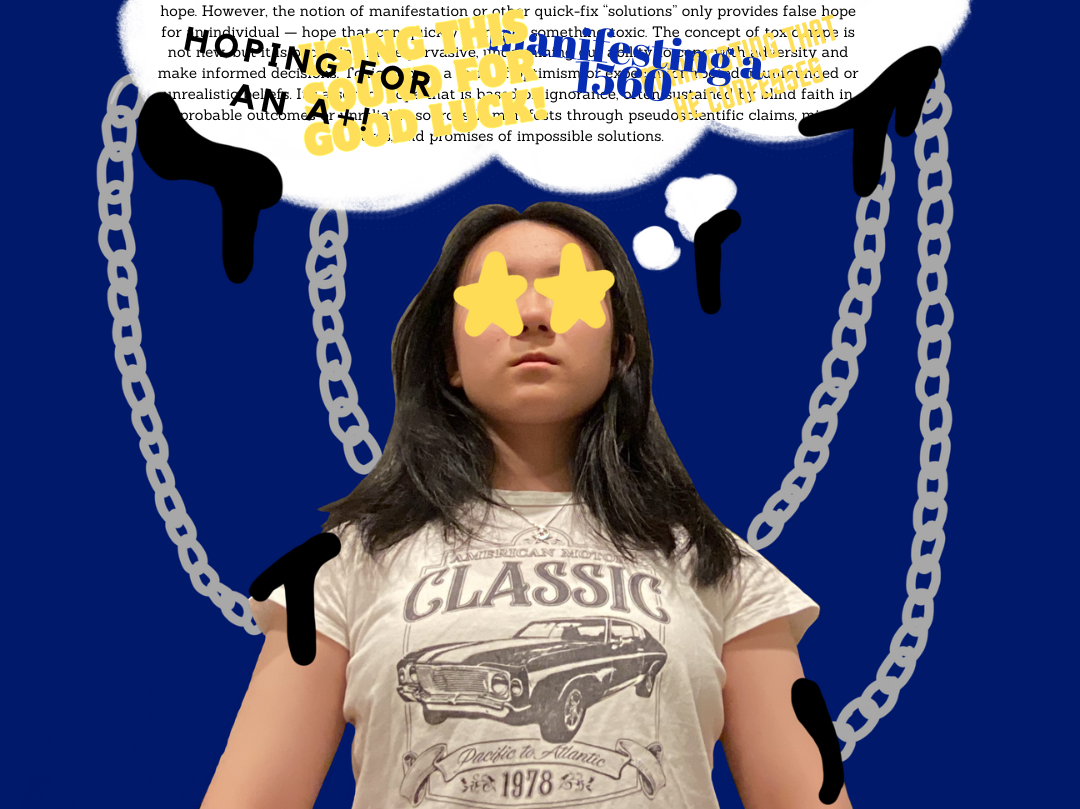Sitting at a desk, the only light is coming from a computer screen at full brightness and the only sound is coming from an unfamiliar song lost in shuffle play. The gap between idling and taking action is only an arms-length away but instead of studying for that physics test, you pull up Instagram and type:
“Manifesting for an A!”
The trend of “manifestation,” turning something from an idea into a reality through positive thinking, gained a new wave of popularity back in 2020 — Google searches for “manifesting” increased by 400 percent at the time. Tarot-card-reading TikTokers promised tangible success from repeating hopes aloud and trending sounds that claimed to be luck-inducing were posted to mantras of “manifesting to pass my AP class” or “manifesting that he/she confesses.”
It is not unusual that, in a world filled with uncertainty, people are quick to yearn for a glimmer of hope. However, the notion of manifestation or other quick-fix “solutions” only provides false hope for an individual — hope that can quickly turn into something toxic.
The concept of toxic hope is not new, but it is becoming more pervasive, undermining our ability to cope with adversity and make informed decisions. Toxic hope is a form of optimism or expectation rooted in unfounded or unrealistic beliefs. It’s a sort of hope that is based on ignorance, often sustained by a blind faith in improbable outcomes or unreliable sources. It manifests through pseudoscientific claims, miracle cures, and promises of impossible solutions.
The reality is, the allure of quick fixes and magical solutions tempts us all. In a world that demands immediate results, we are drawn to shortcuts and easy answers. These promises of instant gratification fuel the growth of toxic hope, and misinformation and social media amplify its spread, turning it into a pandemic of its own.
Moreover, this over-optimistic positivity, over time, fosters passivity over action. According to Therapist Nicole Eaton, “toxic hope typically comes from willing a closed door to re-open and not making any other moves or progress in your life” because too much focus is distributed to shallow desires.
Through unrealistic expectations and complacency, individuals are led to entertain the idea that everything will work out for them even without taking action, hoping positive outcomes will materialize on their own. This passivity is exacerbated by delayed actions, as they postpone necessary steps, thinking that issues will resolve themselves in the future. When this hope inevitably fails to materialize, the disillusionment leads to disappointment and erosion of motivation and confidence.
To effectively counter this issue, we must first learn to recognize our own harmful expectations in areas like physical appearance, academic success, relationships and lifestyle. When we scroll through social media feeds or hear success stories, we tend to hold ourselves up to these expectations, distorting our perception of reality and creating a gap between our actual experiences and what we believe they should be. Since the internet does not help in any way to reduce these unrealistic expectations, developing media literacy to distinguish between reliable and unreliable sources of information is the gateway to learning where the line between false and genuine hope stands.
According to Dr. Jaime Zuckerman, a clinical psychologist based in Pennsylvania, people tend to showcase their most polished selves on social media, seldom sharing their imperfections. “As a result, social media gives off the impression that everyone is handling hard times ‘better than you,’ [and] this fosters a sense of loneliness, shame, and embarrassment.” These emotions make it hard to cope without a glimmer of hope, and as it intensifies with each unrealistic expectation encountered, it can turn toxic.
And although the validity of hope seems out of place from the previous context, there is no problem with coping with another kind of hope — genuine hope. In fact, genuine hope, hope that is based on reality, not only provides emotional comfort, but is also beneficial physically, as it serves as motivation to accomplish our goals and, in turn, provides fulfillment. The issue only arises when we toe the line of genuine and toxic hope, which calls for more reasons to learn to distinguish between the two.
As Elephant Journal suggests, instead of caving to unrealistic expectations, hope for “tangible possibilities and actualities;” instead of blindly latching onto false hopes, first scope out how it makes us feel. “If it feels like a strain, and we are seeing no progress, let it go. When it uplifts our spirits and improves the quality of our consciousness across time, then it’s a keeper.”
Similarly, while manifesting an A on your physics test can be motivating, it becomes counterproductive when over-reliance on manifestation overshadows the importance of thorough preparation. So instead, study diligently for the test, have realistic motivation and trust your abilities.













